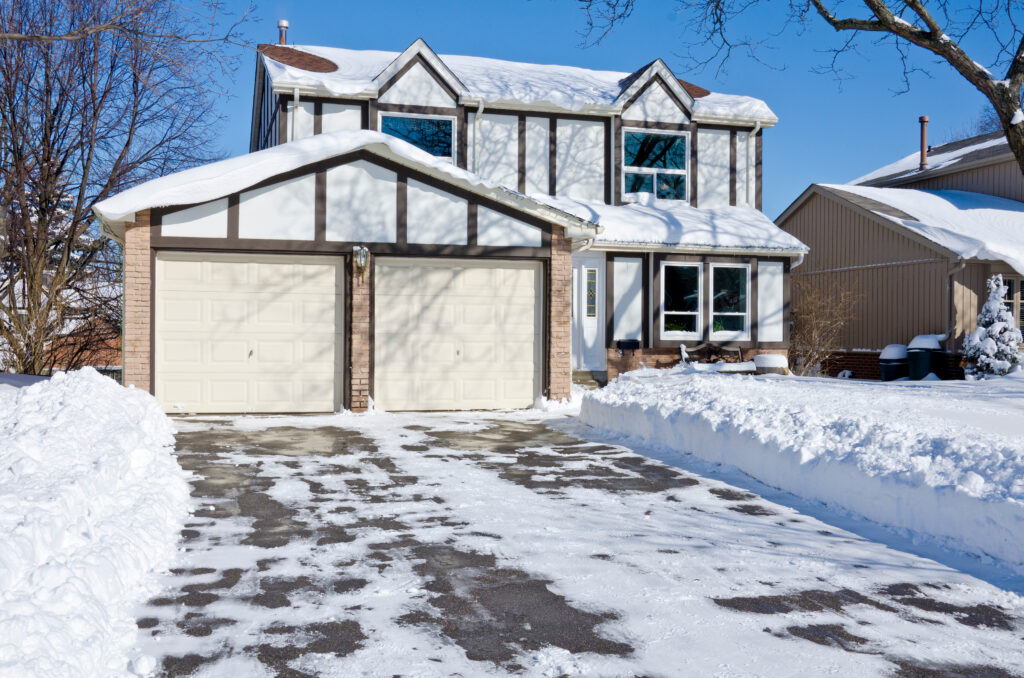Concrete driveways, sidewalks and patios can be a huge investment for a homeowner. Not only do they add value to your home, but they also make life easier by providing a designated space for cars and guests. However, one of the biggest dangers to concrete surfaces is winter weather. In this blog post, we will discuss how to prepare your concrete driveway for winter and keep it looking great all season long!
Sealant Brings Added Protection
One of the most important steps in preparing your concrete driveway for winter is to seal it properly. Sealing concrete helps to protect it from damage caused by freeze-thaw cycles, snow and ice, salt, and other elements.
According to Weatherspark.com, the official cold season in Kansas is from November 27 to February 26, with an average daily high temperature below 50°F. In Kansas City, the coldest month of the year is January, with an average low of 24°F and high of 41°F. Before these months arrive, plan to apply concrete sealer to your driveway, walkways, or stairs leading up to your house.
How Does Sealant Protect Your Concrete Driveway?
Sealants work by filling in any hairline cracks or small holes in the surface of the concrete, making your driveway more durable and less susceptible to damage, and there are several products you can use.
It’s important that sealants used on exterior concrete allow the passage of both air and moisture. If a sealant does not allow for this movement, especially moisture, white hazing or fogging can occur between the sealant and concrete.
De-icer and More
Next on the list of considerations is using a de-icer that won’t harm your driveway, such as calcium magnesium acetate or potassium chloride. This helps to prevent ice formation on your driveway, making it safer and easier to traverse during the cold months ahead.
Additionally, it’s important to remove snow and ice frequently to prevent damage and keep your driveway looking beautiful year-round. With proper preparation and maintenance, your concrete will withstand the harsh winter weather with ease!
Regular Maintenance and Cleaning
Another important step in preparing for winter weather is ensuring that you remove all debris from your driveway on a regular basis before temperatures drop. These can absorb moisture and cause cracks to form over time. You should also avoid shoveling excess snow onto or near your driveway, as this can put added pressure on its surface and lead to cracking or other damage.
It is also important to perform regular maintenance, such as repairing cracks and potholes to prevent water damage and other winter-related damage. If water makes its way into these cracks, it will expand when it freezes and can cause cracks to grow even larger.
Some common materials used to repair concrete driveways include crack fillers, epoxy coatings, polyurea coatings, or even asphalt patching mixtures. When choosing a product for your concrete repair needs, it is important to consider factors such as durability and cost.
Fill in the Gaps with JoCo Foam Pro
Taking the time to winterize your concrete driveway is a simple and effective way to protect your investment and keep it looking great year-round. Failure to do can cost you a pretty penny, not to mention the eyesore of a busted or cracking driveway! According to Forbes.com, a driveway costs between $1,700 to $7,000 for materials, with averages hitting around $4,500. Builders suggest homeowners plan to pay around $15 per square foot for materials and installation. By following these tips and using the right products, you can ensure that your driveway remains strong and functional throughout the winter months and beyond.
If your driveway or sidewalk needs repair and has cracks or gaps that could lead to bigger issues after a season of snow and ice, contact JoCo Foam Pro now to get ahead of the game. Using our polyurethane foam to fill in those areas will extend the life of your concrete.
By investing in our polyjacking concrete services, you can ensure that your concrete driveway stays looking great throughout the winter months and remains a valuable investment for your home.

